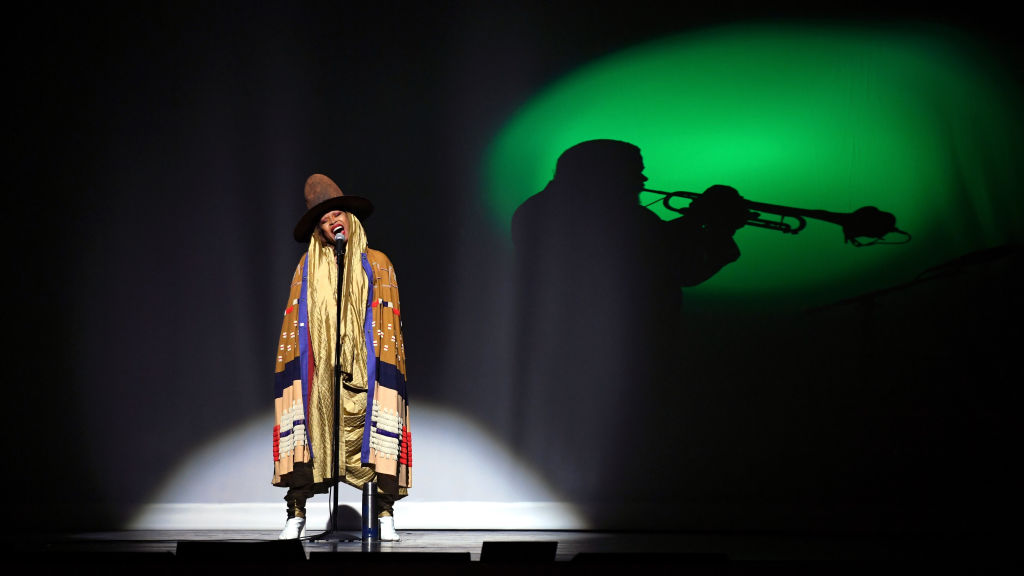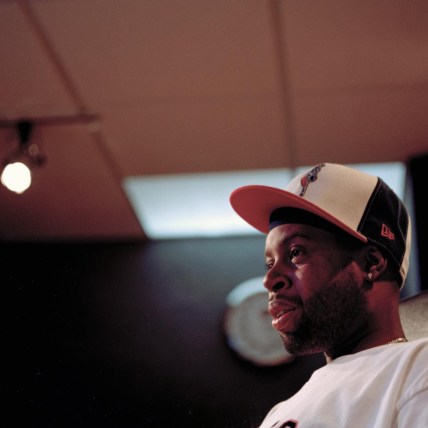I feel about Erykah Badu’s ‘Mama’s Gun’ the way everybody else seems to feel about Lauryn Hill’s ‘The Miseducation of Lauryn Hill’
OPINION: Erykah Badu’s classic sophomore album hits me in such a way thematically and content-wise that, even decades later, I still feel it’s one of the best albums ever released.

Editor’s note: The following article is an op-ed, and the views expressed are the author’s own. Read more opinions on theGrio.
Before we get started, let me be very, very clear: This is not a Lauryn Hill-hate article. Nor is it intended to be an article that devalues the impact of “The Miseducation of Lauryn Hill,” Lauryn Hill’s debut album that turned her into an award-winning, accolade-collecting supernova of a superstar; there’s a reason that her album sold a bazillion records and ended up on every list of all of the greatest things ever created on planet Earth or something like that. The way her album collided with the feelings and desires of what felt like every person who ever felt a feeling in 1998 is the stuff of legend, and I hate that she’s become more known for her antics than the comet she became back then. This article isn’t even about Lauryn Hill.
No, this article is about Erykah Badu’s sophomore studio album, “Mama’s Gun” and how this album impacted me the way Lauryn’s album seemed to impact everybody else. This is a “Mama’s Gun”-stan article.
Let us begin.
I love(d) Erykah Badu. I was introduced to her by my older sister via Badu’s debut album “Baduizm,” which brought about an aesthetic and linguistic wave. I was in high school when the first single “On & On” dropped, and the “Other Side of the Game” and “Next Lifetime” videos might as well have inspired a sea change in the style of dress of Black girls and women everywhere. Of course, Erykah didn’t introduce the headwraps and ankhs and all to the world, but her presentation and albums seem to have an effect similar to how the movie “Love Jones” turned all Black men into poets. I went to college expecting to see Erykah Badu look-a-likes everywhere, and, frankly, I wasn’t wrong. It was awesome. And then when she dropped the live song “Tyrone,” well it was pretty much over. “Baduizm” was everywhere. And I don’t just mean the album. There weren’t names for fans and stans back then, but I imagine Erykah Badu would have had her own club name like Nicki Minaj’s Barbz or Rihanna’s Navy. Or of course, Beyoncé’s Beyhive.
When “Mama’s Gun” dropped in November 2000, I was a senior in college, and like most folks in the Atlanta University Center (AUC), I either went to Audrey’s to get the album a day early — Audrey’s was a cafe/record store/merch shop located right across from the AUC library that we affectionately referred to as Club Woody — or stood in line at Tower Records near Lenox Mall; I can’t remember which. What I do remember is IMMEDIATELY falling in love with this album. My goodness. From the opening song “Penitentiary Philosophy” to one of the most magnificent closing numbers of all time in “Green Eyes,” I was in awe of just how amazing each record was, from the roota to the toota.
When I heard “Didn’t Cha Know,” and realized it was produced by Dilla, well, stick a fork in me, I was done … and that was the second record on the album. Look, if you’ve ever heard this album and you’ve read this far down, there’s a better than 90 percent chance you love the record and don’t need to be told again how good it is. So let’s move on to the epiphany I had while listening.

Questlove to produce J Dilla documentary
Look, I was part of the Lauryn Hill fanfare. Hardbody. As far as I was concerned, Lauryn Hill was the perfect everything. Rapper, singer, gorgeous. Shoot, I stood in line with thousands of folks at Northlake Mall to get her autograph on the book insert for “The Miseducation of Lauryn Hill” album. I still have this and will fight you if you try to take it. But I can’t say I loved the album as much as everybody else seemed to. I mean, I liked it, but I didn’t love it. I appreciated the story she was telling about relationships and growth and loss and all that jazz. I did, seriously. It just didn’t, ya know, hit me. And I was waiting to be hit; I closed my eyes and everything, waiting for that to happen. I wanted it really bad.
Meanwhile, I had that very reaction to “Mama’s Gun.” I wouldn’t shut up about this album. I still remember running “Green Eyes” on repeat for days wishing — at the time — I had somebody to feel that way about. That’s no small feat, by the way; “Green Eyes” is 10 minutes long. I remember talking to the homies about it and how I thought “Mama’s Gun” was a much better album (I still think this) and that I was surprised that people didn’t laud it the same way as Lauryn’s album. Now, don’t get me wrong, “Mama’s Gun” is HEAVILY lauded. It was a critical darling upon its release, and much like Lauryn’s magnum opus landed on lists that use words like important and “before you die.” So quite obviously it’s an album that has received its due.
Over time, though, it feels like Lauryn’s work has become the stuff of both legend and dissection, and I think part of it is that the artist at the center of Lauryn’s album — Lauryn Hill — was such a huge figure and then a polarizing one who became as large as the work where perhaps Erykah, an emerging artist who created subsequent works of note, has stayed fairly even keel. You can find books about Lauryn (not enough books) and her album whereas I feel like “Mama’s Gun” mostly exists in our hearts and minds.
Of course, when a work is just plain good but not marked with any controversy, maybe the work can live on its own and flourish. When a work is marred by controversy — as “The Miseducation” has become — and the artist is as well, perhaps it lends itself to more dissection and that keeps an album ever present in dialogue and discussion. That’s fair.
All I know is that because of the way “Mama’s Gun” sounds and interprets and explains and emotes, I want the books and documentaries and cartoons and all the things. Because for me, this album looms large over an era and a time in my life and it feels like one of the most pivotal of a generation.
It always will.

Panama Jackson is a columnist at theGrio. He writes very Black things and drinks very brown liquors, and is pretty fly for a light guy. His biggest accomplishment to date coincides with his Blackest accomplishment to date in that he received a phone call from Oprah Winfrey after she read one of his pieces (biggest), but he didn’t answer the phone because the caller ID said “Unknown” (Blackest).
Make sure you check out the Dear Culture podcast every Thursday on theGrio’s Black Podcast Network, where I’ll be hosting some of the Blackest conversations known to humankind. You might not leave the convo with an afro, but you’ll definitely be looking for your Afro Sheen! Listen to Dear Culture on TheGrio’s app; download it here.

